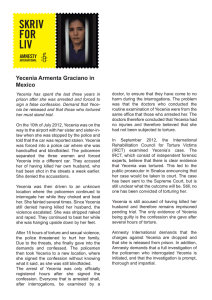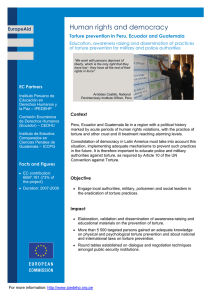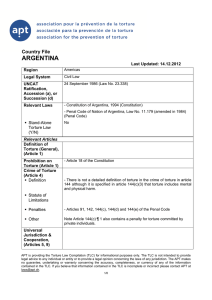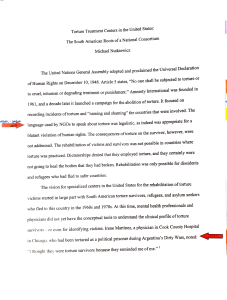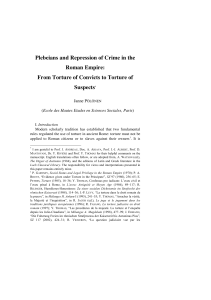Torture Laws compilation - Association for the Prevention of Torture
Anuncio
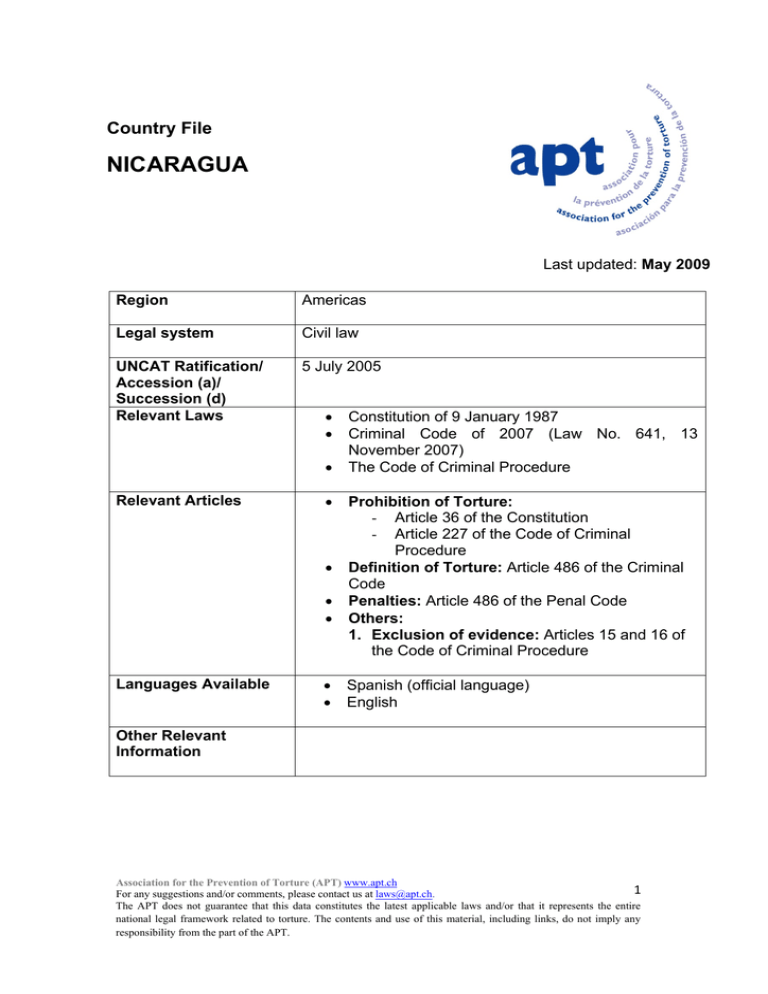
Country File NICARAGUA Last updated: May 2009 Region Americas Legal system Civil law UNCAT Ratification/ Accession (a)/ Succession (d) Relevant Laws 5 July 2005 • • • Relevant Articles • • • • Languages Available • • Constitution of 9 January 1987 Criminal Code of 2007 (Law No. 641, 13 November 2007) The Code of Criminal Procedure Prohibition of Torture: - Article 36 of the Constitution - Article 227 of the Code of Criminal Procedure Definition of Torture: Article 486 of the Criminal Code Penalties: Article 486 of the Penal Code Others: 1. Exclusion of evidence: Articles 15 and 16 of the Code of Criminal Procedure Spanish (official language) English Other Relevant Information Association for the Prevention of Torture (APT) www.apt.ch 1 For any suggestions and/or comments, please contact us at [email protected]. The APT does not guarantee that this data constitutes the latest applicable laws and/or that it represents the entire national legal framework related to torture. The contents and use of this material, including links, do not imply any responsibility from the part of the APT. Relevant Articles – NICARAGUA SPANISH Constitución de 9 de enero de 1987 Artículo 36 Toda persona tiene derecho a que se respete su integridad física, psíquica y moral. Nadie será sometido a torturas, procedimientos, penas ni a tratos crueles, inhumanos o degradantes. La violación de este derecho constituye delito y será penado por la ley. Código Penal del 2007 (Ley No. 641, 13 de noviembre de 2007) Artículo 486 Quien someta a otra persona a cualquier tipo de tortura física o psíquica con fines de investigación penal, como medio intimidatorio, castigo personal, medida preventiva, pena o cualquier otro fin, será sancionado con pena de siete a diez años de prisión. A la autoridad, funcionario o empleado público que realice alguna de las conductas descritas en el numeral anterior se le impondrá, además de la pena de prisión, la de inhabilitación absoluta de ocho a doce años. La autoridad, funcionario o empleado público que no impida la comisión de alguno de los hechos tipificados en los párrafos anteriores, cuando tenga conocimiento y competencia para ello, será sancionado con pena de cinco a siete años de prisión e inhabilitación especial para ejercer el empleo o cargo público de cinco a nueve años. La misma pena se impondrá a la autoridad, funcionario o empleado público que, teniendo conocimiento de la comisión de alguno de los hechos señalados en los párrafos anteriores y careciendo de competencia, omita denunciar el hecho ante la autoridad competente dentro de las cuarenta y ocho horas siguientes, a partir del momento en que los conoció. Para los efectos de este Código, se entenderá por tortura causar intencionalmente dolor o sufrimientos graves, ya sean físicos o psíquicos, a una persona que el acusado tenga bajo su custodia o control, sin embargo no se entenderá por tortura el dolor o los sufrimientos que se deriven únicamente de sanciones lícitas o que sean consecuencia normal o fortuitas de ellas. Association for the Prevention of Torture (APT) www.apt.ch 2 For any suggestions and/or comments, please contact us at [email protected]. The APT does not guarantee that this data constitutes the latest applicable laws and/or that it represents the entire national legal framework related to torture. The contents and use of this material, including links, do not imply any responsibility from the part of the APT. Código Procesal Penal Artículo 15 Cualquier hecho de interés para el objeto del proceso puede ser probado por cualquier medio de prueba lícito. La prueba se valorará conforme el criterio racional observando las reglas de la lógica. Artículo 16 La prueba sólo tendrá valor si ha sido obtenida por un medio lícito e incorporada al proceso conforme a las disposiciones de este Código. Ninguno de los actos que hayan tenido lugar con ocasión del ejercicio del principio de oportunidad entre el ministerio público y las partes, incluyendo el reconocimiento de culpabilidad, será admisible como prueba durante el juicio si no se obtiene acuerdo o es rechazado por el juez competente. Artículo 227(2) Queda prohibida la utilización de la tortura, procedimientos o tratos crueles, inhumanos o degradantes, y de cualquier otro medio de presión atentatorio contra la dignidad humana en la práctica de la investigación policial. ENGLISH (Translation) Constitution of 9 January 1987 Article 36 Every person shall have the right to respect for his physical, psychological and moral integrity. No-one shall be subjected to torture or to cruel, inhuman or degrading procedures, punishment or treatment. Violation of that right shall constitute an offence punishable by law. Penal Code of 2007 (Law No. 641, 13 November 2007) Article 486 Anyone who subjects another person to any physical or mental torture for the purpose of criminal investigation as a means of intimidation, personal punishment, preventive measure, penalty or any other purpose shall be sentenced to seven to ten years of imprisonment. The authority, official or public employee who performs any of the acts described in the preceding paragraph shall be imposed, in addition to imprisonment, disqualification of eight to twelve years. Authority, official or public employee who may not prevent the commission of any of the acts defined in the preceding paragraphs, when they have the knowledge and competence to do so, shall be punished by five to seven years Association for the Prevention of Torture (APT) www.apt.ch 3 For any suggestions and/or comments, please contact us at [email protected]. The APT does not guarantee that this data constitutes the latest applicable laws and/or that it represents the entire national legal framework related to torture. The contents and use of this material, including links, do not imply any responsibility from the part of the APT. imprisonment and disqualified for the use or exercise of public office for five to nine years. The same penalty shall be imposed on the authority, official or public employee who, having knowledge of the commission of any of the facts outlined above and lack of competition, he fails to denounce the fact to the competent authority within forty-eight hours following, from the moment they knew it. For purposes of this Code, torture is defined as intentionally causing pain or suffering, whether physical or mental, upon an accused person in their custody or control, however, torture does not mean pain or suffering deriving only from legal penalties or incidental or consequence of them. Code of Criminal Procedure Article 15 Any fact related to the object of the trial may be proved by any means of lawful evidence. The evidence shall be assessed on rational criteria observing the rules of logic. Article 16 Evidence shall only be valid if it has been obtained by lawful means and incorporated into the proceedings in accordance with the provisions of this Code. No proceedings which have taken place pursuant to the principle of discretion between the Public Prosecutor’s Office and the Parties, including plea-bargaining, shall be admissible as evidence during the proceedings where no agreement has been reached or where it is dismissed by the competent court. Article 227(2) The use of torture, cruel, inhuman or degrading treatment or procedures and of any other method of applying pressure prejudicial to human dignity is prohibited in police investigations. Association for the Prevention of Torture (APT) www.apt.ch 4 For any suggestions and/or comments, please contact us at [email protected]. The APT does not guarantee that this data constitutes the latest applicable laws and/or that it represents the entire national legal framework related to torture. The contents and use of this material, including links, do not imply any responsibility from the part of the APT.

